hr-television, 8.15 p.m.
In the east of Cape Town, wines of world renown grow in front of a breathtaking backdrop.
SWR television, 3.45 p.m.
If you come from Mannheim or Ludwigshafen and want to go to Bad Dürkheim to drink wine, you either have to stay overnight or take the 4 A, the tram that becomes a railway from Oggersheim, better known as the Rhein-Haardtbahn. It connects the metropolis with the region, Baden-Württemberg with Rhineland-Palatinate, and is just as important a route today as it was in the past, not only for responsible visitors to Weinbergsnacht.
3sat, 4.00 p.m.
In the fertile valley of the Ebro lies Tudela, the vegetable capital of Spain, birthplace of famous wines in the Navarra wine-growing region.
ZDFinfo, 9.15 a.m.
It is "our" longest river: the Rhine flows over 800 kilometres through Germany. Vineyards and castles make it a tourist attraction, but it is also an important trade route.
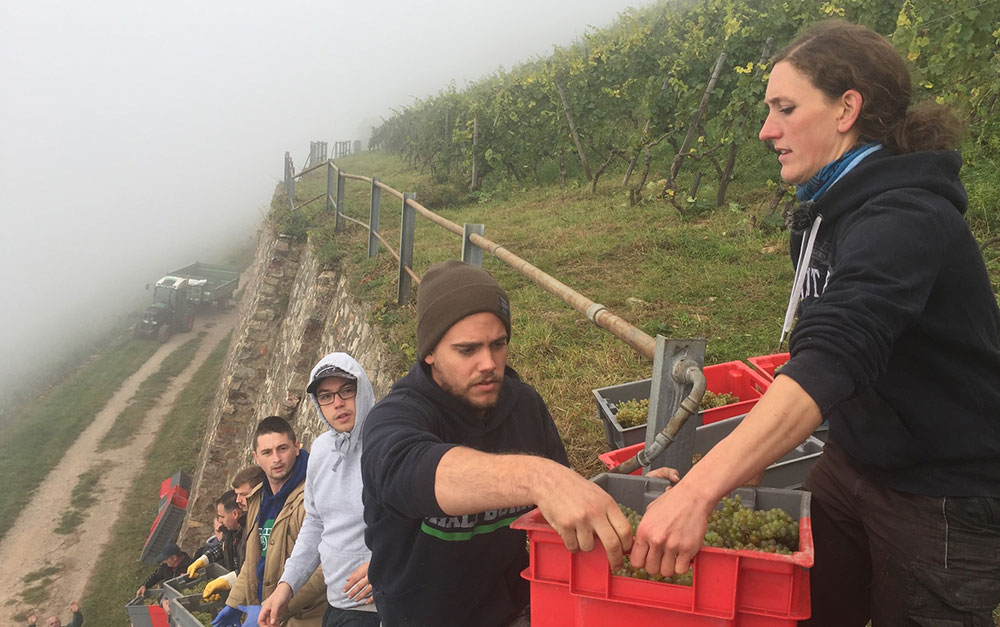 |
SWR Television (RP), 6.05 p.m.
Osann-Monzel consists of the districts of Osann and Monzel. The two Moselle villages lie close together, separated only by a road bridge. As is hardly surprising on the Moselle, viticulture plays a major role in both villages. However, contrary to what one might expect in this region, the vineyards around the double village are so flat that the grape harvest can be comfortably carried out with a full harvester. In fact, about half of all grapes on the Mosel are harvested by machine. A large contracting company for machine harvesting is based in Osann - in Bernkasteler Straße. This is actually the main street of the district, because it leads from one end almost to the other, past wineries, wine taverns and two butchers.
3sat, 1.15 pm
Some districts of Vienna belong to the Wienerwald, and they are known for one thing above all: winegrowing and the continuation of the tradition of the Viennese "Gemischter Satz". Winemaker Fritz Wieninger explains to Simin Sadeghi what this is all about.
Bavarian Television, 11.10 a.m.
You can take a holiday on a vineyard, for example at Chateau Carbonneau near Bordeaux, including the grape harvest and the French way of life. The owners, a winemaking couple, rent out five guest rooms there. Chateau Carbonneau is one of around 3,000 vineyards around Bordeaux. The owners, the winemaking couple Jacquie and Wilfrid Franc de Ferrière, rent out five guest rooms there. Those who stay with them are not only allowed to taste their wine, but also to help with the grape harvest. Wilfrid likes to take his guests to the barrel cellar, where the wine matures for around eleven months in oak barrels and where expert chatter about its characteristics can be celebrated in the ideal ambience. The film shows the effort that goes into making the classic Bordelais wine barrels. The barrel maker is also an amateur pilot and takes Wilfrid on a sightseeing flight to see the region and his castle from above. Wilfrid's wife Jacquie is from New Zealand, and because she has a fondness for roses, she has planted almost two hundred rose bushes on the estate. A New Zealand intern helps her with her work, and Jacquie also gives her an insight into the French way of life. She explains to her, for example, typical regional recipes, such as the one for cannellés, a dessert that would not exist without red wine. Jacquie cooks for her guests every evening. The stylish dinner is of course accompanied by the hotel's own wines. And caviar from the region. We continue to the centre of Bordeaux, for example to the antique dealers in the Chatrons district, but also to other attractions that are easily accessible from Bordeaux, such as the Arcachon basin, where oysters are farmed; to the Dune du Pilat, the largest shifting sand dune in Europe; to the Phare de Cordouan, the oldest lighthouse in France that is still manned, or to St. Emilion to an underground wine cellar that used to be a quarry.
ORF III, 5.35 p.m.
In the border area between Austria and Slovenia lies the southern Styrian wine country.
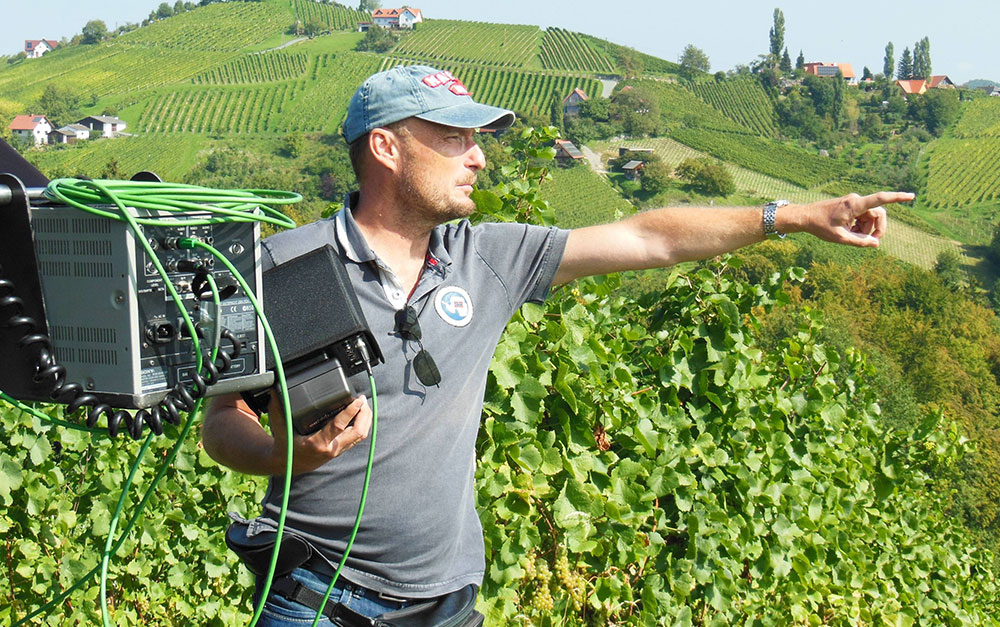 |
ZDFneo, 5.25 a.m.
Amateur divers recover ancient bottles from an unknown wreck in the Baltic Sea - filled with champagne that has apparently long been undrinkable. But then it turns out that each bottle is worth more than 10,000 euros. Surprisingly, the noble drop has kept excellently in the depths and still tingles deliciously. "Terra Xpress" tests whether the storage of champagne and wine under water can keep up with common methods on land.
arte, 6.35 p.m.
The city Porto - it is the "industrious one" in Portugal's north. And in the meantime it has become a cult metropolis. For in the traditional port and trading city at the mouth of the Douro into the Atlantic, there is a spirit of optimism: more and more young Portuenese are becoming creative in defiance of the economic and financial crisis and are gradually giving the port city a new face with their original ideas.
3sat, 6.05 a.m.
Winegrower Chiara Vigo remembers how, as a child, she had to witness that an eruption in the north near Randazzo destroyed almost all of her family's vineyards: a catastrophe, because even today one cannot insure oneself against it on Etna. She will never forget that the lava flow left a remnant of their belongings and "miraculously" suddenly changed direction, as Chiara recounts in the film. Together with her husband Gianluca, she now grows "Nerello Mascalese" here, the typical red grape variety of the few, approximately 130 winegrowers on Etna. She appreciates that the volcano not only takes but also gives. The fertile and mineral-rich volcanic soil enables the cultivation of wine, olives, pistachios and much of what makes up Sicilian cuisine.
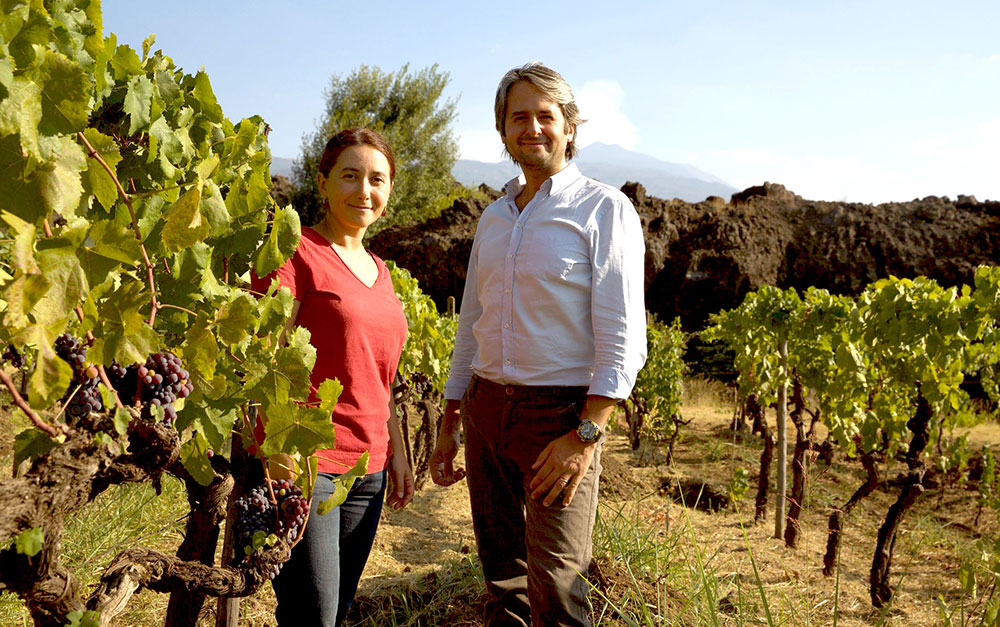 |
rbb television, 3.15 p.m.
Wine has made the area around Lake Kaltern wealthy. The film introduces a young winemaker from South Tyrol who runs a multilingual online magazine.
SWR Television, 6.15 p.m.
The Wiesbach runs between the Donnersberg in the Palatinate and Gensingen on the Nahe. On its approximately 45-kilometre journey from its source to its mouth, the little stream crosses forests, idyllic wetlands and vineyards. And then there is the vintners' hotel at La Roche with perhaps the most beautiful view over the Wiesbach valley. Frank Spaleniak, a young winemaker, has realised his grandfather's long-cherished dream, together with his partner Nadeschda Schmitt. However, it is a special hotel, from the wine to the breakfast to the dishes for the Straußwirtschaft, everything is vegan. For example, the Rheinhessen burger or the soy goulash. The surprising thing about it: it tastes wonderful - honestly!
hr-television, 9.00 p.m.
Along the Loire, famous wine regions such as Sancerre attract visitors.
n-tv, 23.10 hrs
hr-television, 4.00 p.m.
The "Ankermühle" inn in the Rheingau is run with great passion. Birgitt Hüttner loves fresh tasty cuisine with products from the region surrounded by vineyards.
arte, 10.45 a.m.
In the middle of the Andes, at an altitude of 2,300 metres, lies a private museum dedicated exclusively to one artist: the American light artist James Turrell. It was built by the Swiss art collector and entrepreneur Donald Hess. His museum is surrounded by vineyards, with a breathtaking view of the peaks of the Andes. Colomé is in northwest Argentina, near the border with Bolivia and Chile. The nearest major city is over 200 kilometres away, and it takes at least five hours to drive over dusty dirt and sand roads. Entrepreneur Donald Hess has been collecting art for over 40 years and owns wineries all over the world: in the USA, Australia and South Africa. In 2001, he bought Bodega Colomé, the oldest winery in Argentina. The clear light at this high altitude and the lonely landscape inspired the collector. Colomé was the perfect place for him to present the works of his favourite artist.
hr-television, 3.45 p.m.
Above all, the imposing castles and gardens along the Loire are major attractions for holidaymakers. These include the gardens of the Château de Villandry or those of the Château de la Bourdaisière near Tours. Here you can marvel at over 600 different types of tomatoes. Along the Loire, famous wine regions such as Sancerre also attract visitors. 400 kilometres further north, things look quite different: Metre-high chalk cliffs tower over turquoise-green seas. Normandy, the land of apple trees and Calvados, stretches between Honfleur, Le Havre and Calais. With Le Touquet, the region has an elegant seaside resort with enchanting 19th century villas, which proudly bears the nickname "Paris-Plage" - "Beach of Paris" - and with its wide sandy beach is also suitable for very special sporting activities - for which the constant wind is even a great advantage. In terms of cuisine, too, the far north of France can certainly compete with the other regions.
WORLD, 6.05 p.m.
The Germans' favourite fruit is the apple, followed by the banana and the grape. The numerous German wineries prove that the latter are not only great for snacking, but also make a delicious juice.
hr-television, 6.30 p.m.
The contracts have been signed, guarantees and loans have been secured, the sale is perfect: at the age of 67, Dieter Walz hands over his Odenwald noble distillery and sparkling wine factory to Max Bäumlisberger. Even though the apple harvest was sparse last year, the 27-year-old Bäumlisberger hopes to continue the business successfully. Fortunately, the old boss is still available to help and advise the young successor for some time. Bäumlisberger wants to win new customers and build up a new brand. Many things are new and surprising for the young entrepreneur. But as a bioanalyst and fruit tree expert, he has convinced the old boss, and he is not easily intimidated - even if things don't go smoothly at the beginning. Last year there were crop failures in the Odenwald due to late frost, and the orchards did not produce enough apples in autumn to ramp up production as planned. In addition, the racking move to a rented hall in the Erlenbach district of Fürth is proving to be far more complicated than expected. The plan to be able to actively run the Christmas business under their own name at the new location is at stake. Improvisation is called for. So it is good when the first raspberry brandy can finally be distilled in the still. Dieter Walz founded the distillery in 1994 after he became unemployed as a mechanical engineer. He relied on Odenwald orchards and a contract distillery and built up a flourishing manufactory. Regional ingredients are processed. The products are sold directly from the farm, through regional grocers, but also in delicatessen shops and online. After a long search, Walz found a successor to whom he sold the technical equipment, part of the warehouse, the rights to the brand, know-how, business relations and his orchard. It is a matter of several hundred thousand euros - for Walz the money to be able to retire, for Max Bäumlisberger an entrepreneurial investment. A risk or a stroke of luck? How does the transition from old boss to young successor work out? The "Hessenreporter" followed the first months.
ZDF, 8.15 p.m.
The young oenologist Sandra is looking for a unique red wine for her client's repertoire in Sicily and finds the man for her life along the way. The international wine merchant Reinhold relies on Sandra's nose, which has already found many a fine wine. In Sicily, it should be a special grape variety. When Sandra finally finds it, a shipwrecked man initially thwarts her ambitious plans. "Robinson" is the name Sandra gives to the man she finds on the beach and rescues. He has lost his memory, and in hospital she learns that this condition may last for several days. Her care for the enigmatic man triggers a certain affection in Sandra. She falls in love, and then she learns his true identity. Bruno Haller is married in Germany and has a daughter. In the end, however, things are not what they seem. And just as wine cannot thrive without water, Sandra will never leave Sicily without her new love.
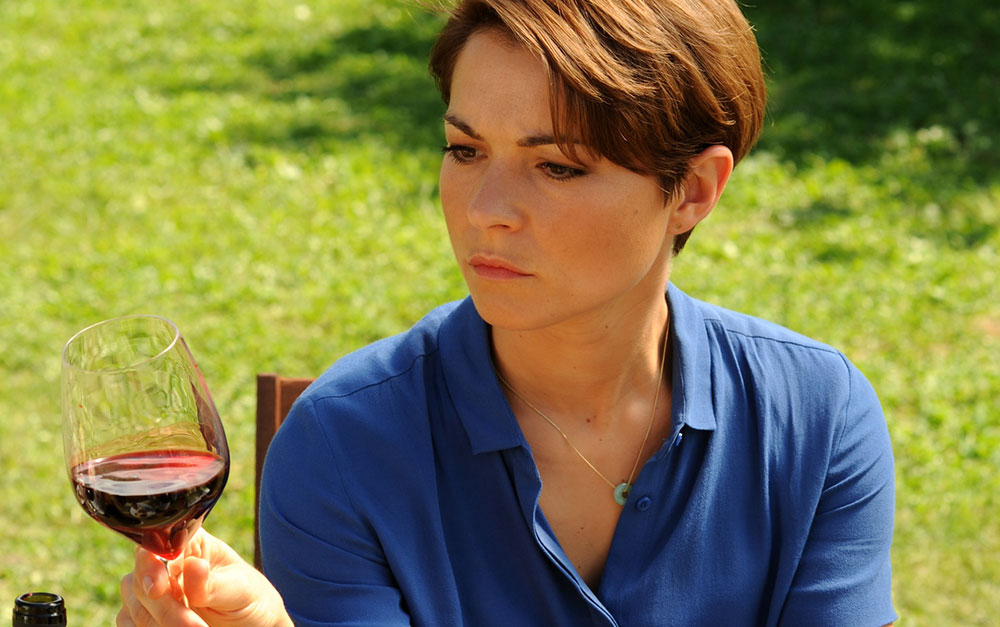 |
ARD-alpha, 10.15 a.m.
In autumn, the vineyards are bustling with activity: the grapes are harvested and delivered to the wine cellar. Wine technologists receive them, press the juice and turn it into wine.
Bavarian Television, 11.55 a.m.
Freiburg is often called the "Florence of Germany". Freiburg connoisseur Hans-Albert Stechl shows how to spend an enjoyable day in this green city, which traditionally begins and ends at Münsterplatz. Right on Freiburg's doorstep is the Kaiserstuhl region with its idyllic winegrowing villages.
ARD-alpha, 4.55 p.m.
You don't have to, but you should and could and perhaps want to know: why Antonio Giacomo Stradivari loved the maple tree so much. Or that the hop is a dioecious plant. Or that the fly agaric belongs to the orchid family...all this and much more is revealed in the 52-part series "From Maple to Onion - Plants in our Environment". It teaches how to distinguish between plants according to their growth form or to grasp the characteristic features of a deciduous tree, for example. It informs about the healing power, usefulness or origin of the individual plants and thus becomes a 52-part "plant picture book" in 5-minute chapters, with beautiful nature shots, elaborate 3D animations and sophisticated time-lapse effects.
hr-television, 9.45 p.m.
The Rheingau is an ancient cultural landscape. Even the ancient Romans appreciated the Rhine and wine, which have entered into a fruitful symbiosis here thanks to the geographically privileged location. The series "This is how old Hesse was" reconstructs the face of Hesse's towns and regions before the destruction and deep cut of the Second World War. Film author Jörg Adrian Huber interviewed contemporary witnesses, collected old films and roamed Hessian towns and regions with his camera team in search of traces of the past. In the Rheingau, he visits the wine village of Kiedrich. It is called a "treasure chest of Gothic architecture", because an unusually large number of buildings from that era have been preserved here in a very small area. Again and again, the film shows contrasts between old film images of the Rheingau and the evidence of "modern times" such as "high-tech" wine production and the blighting of the once fantastically beautiful Rhine bank landscape by motorways and goods train lines. Rare photographs remind us of centuries-old ways of living and working in the vineyards that can hardly be found today.
ORF 2, 2.05 p.m.
Vienna is the only cosmopolitan city in which wine is cultivated and specific wines are produced. The city has a high wine and "Heurigen" culture: originally simple pubs that were only open at certain times and served the so-called "Heurigen", i.e. young wine. Today there is a wide range of restaurants offering typical Viennese specialities: Backhenderl, schnitzel and potato salad are not to be missed. Sitting together in a cosy atmosphere and murmuring together is a Viennese trait that is explored in this episode. Vienna's four major wine-growing regions are shown as well as the philosophy of some Viennese winegrowers. A very typical Viennese wine speciality that has experienced a real renaissance in recent years is the "Wiener Gemischter Satz", which is offered far beyond the country's borders all over the world. As a Grüvi in New York as well as a suitable accompaniment to food in Japan. A real "G'spritzer" is made with soda water. In this episode, viewers will learn why this is so and how the spritzer is prepared correctly. In addition, the secrets and techniques of Vienna's traditional sparkling wine producers and their cellars are revealed.
ORF 2, 2.05 p.m.
The stretch of the Danube between Melk and Krems is one of the oldest cultural landscapes in Europe with a wine-growing tradition that goes back almost two millennia. The Wachau is a region of nostalgia and clichés and at the same time a lively and powerful living space where very special wines thrive. And exceptional winemakers are at work. In one of the most famous vineyards, Achleiten near Weißenkirchen, "Eingeschenkt" meets a terroir specialist. The climate in the Wachau also has a beneficial effect on the soul and on around 150,000 apricot trees, whose blossom and fruit residents and visitors eagerly await. After a ride on the Wachau Railway, the "Eingeschenkt" team will stop at the Domäne Wachau near Dürnstein.
SWR Television, 8.15 p.m.
The Löwensteiner Mountains are home to numerous family businesses that have made a name for themselves far beyond the region. SWR presenter Annette Krause meets castle lords and organic winegrowers, among others, during her expedition.
hr-television, 21.00
The unknown north of Portugal shows itself in lush green: There is the wine town Porto at the mouth of the river Douro.
hr-television, 12.35 p.m.
hr-television, 4.00 p.m.
Football is serious business for them, no question. But the kickers of the German Wine Team are at their best in the third half - when good food and first-class wines are on the table. In the German Wine Team, football-mad winemakers and wine experts - many of them from the Rheingau region - have come together to pursue their hobby and promote German wine. In the run-up to the World Cup, they met winemaking teams from Italy, Austria, Hungary and Slovenia in Tuscany. The tournament is not only a sporting but also a gastronomic showdown. Nina Thomas and Bernd Kliebhan observed the tournament and took a close look at all the chefs' pots and pans.
3sat, 6.45 a.m.
The journey takes us along the vineyards of the Moselle into the Middle Rhine Valley, where the Hunsrück slopes steeply down to the Rhine.
hr-television, 6.00 p.m.
"A convent is a great talent shed. You discover things about yourself that you had no idea about before." This is what Sister Thekla says, who first learned the profession of winemaker at the St. Hildegard convent in Rüdesheim - because it was needed. The monastery includes extensive vineyards where grapes are harvested for the monastery's own white and red wine. Sister Thekla also walks through the vineyard with groups of visitors. Viticulture, like the monastery shop, the goldsmiths or the ceramics workshops, is a separate branch of the economy that finances monastic life in Rüdesheim.
hr-television, 11.05 a.m.
The Rheingau is an ancient cultural landscape. Even the ancient Romans appreciated the Rhine and wine, which have entered into a fruitful symbiosis here thanks to the geographically privileged location. The series "This is how old Hesse was" reconstructs the face of Hesse's towns and regions before the destruction and deep cut of the Second World War. Film author Jörg Adrian Huber interviewed contemporary witnesses, collected old films and roamed Hessian towns and regions with his camera team in search of traces of the past. In the Rheingau, he visits the wine village of Kiedrich. It is called a "treasure chest of Gothic architecture", because an unusually large number of buildings from that era have been preserved here in a very small area. Again and again, the film shows contrasts between old film images of the Rheingau and the evidence of "modern times" such as "high-tech" wine production and the blighting of the once fantastically beautiful Rhine bank landscape by motorways and goods train lines. Rare photographs remind us of centuries-old ways of living and working in the vineyards that can hardly be found today.
ORF 2, 2.05 p.m.
The Leithagebirge and the Neusiedlersee characterise the wines here in particular. For "Eingeschenkt" Birgit Braunstein and Heidi Schröck go into the vineyards with a wheelbarrow and a spade to bring to light the secret of the soil at the Leithagebirge, which becomes visible where only the roots of the vines can reach: Quartz, mica slate and above all shell limestone from the former primeval sea determine the geology here. Wines that emerge from this are terroir wines as they are written in the book. That is why the Leithaberg DAC focuses on the origin and not on the grape varieties, of which there are many here, especially in the white range.
ORF 2, 2.00 p.m.
Of Austria's three wine-growing regions, the "Bergland" area is the least known. It comprises the provinces of Carinthia, Salzburg, Upper Austria, Tyrol and Vorarlberg. Until the 17th century, there were also wine-growing areas in the southernmost and western provinces. Climate shifts and economic crises almost completely displaced viticulture from these cooler parts of the country. But some small islands of viticulture are benefiting from global warming today. Thus, land after land is being wrested from the soil for new vineyards. Where is the renaissance taking place? And what can the new wine from the mountains do?
rbb television, 3.15 p.m.
The Mediterranean metropolis of Barcelona is developing rapidly and unites like no other city in Europe. In the midst of this cultural, international melting pot, we meet winemaker Jabier Marquinez. His winery is located in the Spanish province of La Rioja. With Jabier we discover a piece of old Barcelona, the Jewish quarter on the Ramblas. Here he meets special customers. For the Jewish community, Jabier produces kosher wine. A speciality that enjoys the highest recognition among international wine connoisseurs. Thanks to strict religious regulations and supervision, the result is probably the purest organic wine in the world. With Jabier, the winemaker, we set off northwest by train towards Rioja.
Bavarian Television, 11.10 a.m.
The distillation of absinthe has a long tradition. Absinthe connoisseur Antoine Générau visits various herb farmers and distilleries and is shown methods of production. Absinthe was banned in 1915. It was replaced by pastis, which is now an indispensable part of southern France. No other spirit holds as many secrets and stories as absinthe. Absinthe is a strong alcohol flavoured with absinthe herb that is drunk diluted with water. At one time, half of France, including women, met at the "green hour" to pay homage to the "green fairy". The consumption of absinthe was libertarian and mysterious, and it was banned in 1915. It was replaced by pastis, which is now an indispensable part of southern France. But absinthe has other siblings: in the mountains of Chartreuse, silent monks of the Great Charterhouse have been distilling their green liqueur for 500 years. Only two monks know the recipe. The herbs for Génépi grow in the high Alps, and on the Mediterranean coast wines are refined with herbs and spices into a dry Vermouth. In the mountains of the Swiss Jura, Antoine Générau begins a journey that will take him all the way to the south of France. A journey into the world of absinthe. Générau runs a trade for absinthe and is always on the lookout for new varieties - today absinthe is allowed again. Bottles of original absinthe from the time before the ban can now even cost thousands of euros.
ORF 2, 2.05 p.m.
The wine-growing region of Wagram, situated north of the Danube along the loess wall of the same name, also includes the Großlage Klosterneuburg south of the Danube, which cherish and cultivate their common cultural asset, wine. With special attention to the protection of soil and climate. The loess of the Wagram is an ideal soil for spicy, powerful wines. But it also needs winemakers who are innovative and know how to deal with the conditions. "Eingeschenkt" looks over the shoulders of the biodynamically working winemakers Bernhard Ott and Karl Fritsch. One is dedicated to the ancient technique of making wine in amphorae, the other to alternative methods of fertilisation, for example using cow horn preparations stirred with a kind of "witches' broom".
SWR Television, 6.15 p.m.
For a long time it was a big secret: Terra Preta, the mysterious black earth of the Indians of the Amazon, which can make infertile soils fertile again. Many experts around the world have tried unsuccessfully to uncover its millennia-old secret. Until, ten years ago, Joachim Böttcher and a team of scientists finally unravelled the historical Terra Preta. In an elaborate series of experiments, the horticultural engineer succeeded in reconstructing the exact composition of the miracle soil on his idyllic farmstead on the Donnersberg: He mixed plant charcoal with special microorganisms, sewage sludge and other ingredients and let the mixture ferment in home-made rain barrels. Böttcher is convinced that his Palatinate "Palaterra" can solve many problems: It ensures sustainable humus build-up and ultimately healthy and particularly vigorous growth - whether for flowers, lawns, vegetables or in agriculture. In addition, the soil is ecologically sound, binds carbon dioxide in the soil and is absolutely free of peat. The Palatinate researchers' discovery has been causing quite a stir among experts for quite some time. For while the world's population is growing, arable land is shrinking dramatically. In the meantime, the company is on the verge of global marketing and corresponding expansion. Winegrowers and fruit growers are discovering Palaterra. There are enquiries from California, Morocco, Calabria. How is Joachim Böttcher dealing with this onslaught? His great goal is nothing less than an agricultural turnaround, a revolution in industrial agriculture.
ORF 2, 2.00 p.m.
Austria's southernmost wine-growing region, hard on the border with Slovenia, is entirely dominated by the sun. A little off the beaten track, nestled in a romantic hilly landscape: Southern Styria. It stands for fragrant, fresh white wines and has earned itself a place at the top both in Austria and internationally. The soils and climate are as complex as the grape varieties. Which raises the question: What is the typical wine of southern Styria? Welschriesling or perhaps Sauvignon Blanc?
3sat, 3 .35 p.m.
The gold of today in New Zealand is wine, as winemaker Nick Mills tells us. Pinot Noir is the most famous grape variety of the southernmost of all vineyards, which has gained international recognition. Just as ships full of hopeful gold miners used to come to New Zealand, today they set off in the opposite direction, laden with wine.
hr-fernsehen, 8.15 p.m.
The inhabitants of the Italian Piedmont know a lot about enjoyment - famous wines like Barolo or Barbaresco come from this region, and everywhere people like to cook well. Tuscany is also a region for lovers of scenic, cultural and culinary discoveries. Its trademark: gently rolling hills, vineyards close together, small villages in Chianti, and in between the parade of dark green cypresses.
arte, 10.40 a.m.
The programme is also available online from 23/06 to 22/08 on the ARTE internet portal. Who would have thought that the French would grow a Chinese Cabernet Sauvignon in the foothills of the Himalayas? That South Australian Shiraz is drunk all over the world? Or that Hungarian Tokay belongs to Italian, Spanish and American investors? In Europe, wine is still strongly associated with its respective region of origin. Yet a world market has long since emerged from this.
SWR Television, 3.45 p.m.
The Reblaus Express winds its way uphill through the vineyards of Retz - it travels leisurely from the Weinviertel to the Waldviertel. An old line, actually long since disused, in a sparsely populated area. Vines, fields and forests alternate, a paradise for cyclists, who enjoy using the Reblaus Express, which is run by an association. In the past, mainly wood and grain were transported here, but now they are even thinking about resuming freight traffic. At least on weekends, the idyllic railway is experiencing a renaissance, just like the Waldviertel narrow-gauge railway, which is once again attracting guests with steam trains. Here, too, the saying goes: there's life in the old dog yet. Railway romance let itself be rocked in historic carriages by the "Wine in the Forest".
hr-television, 4.45 p.m.
Nina Thomas takes a trip to the other side of the Rhine - to the "ebsch Seit", as it used to be called. That is long gone, and the Hessians on both sides enjoy visiting each other. Rheinhessen has excellent wines and many creative chefs. On a trip through the rolling hills of the vineyards, Nina Thomas visits a vintner, looks into the pots in country inns and restaurants, climbs into an old, winding wine cellar and experiences a vintner's vesper with Weck, Worscht and Woi on the red slope.
WDR Television, 5.45 p.m.
Franconian cuisine is as versatile as the land itself. People love the wine, which is produced here in great qualities, especially along the Main, but also the beer, some varieties of which are world-famous: for example, the dark smoked beer from Bamberg. Whether beer or wine, you need a little bite to eat.
ZDFinfo, 5.30 a.m.
Winegrower Hildegard Stigler leads the kind of life many people imagine. She regularly stands in her vineyards, prunes the vines and enjoys the landscape. Afterwards, she sits with the whole family at "Vesper", the evening meal. With a glass of wine from her own vineyard, of course. "It's a cosy life here," she says, "it lets us grow old. We don't have any stress." In fact, women in the Breisgau-Hochschwarzwald region have the highest life expectancy in Germany.
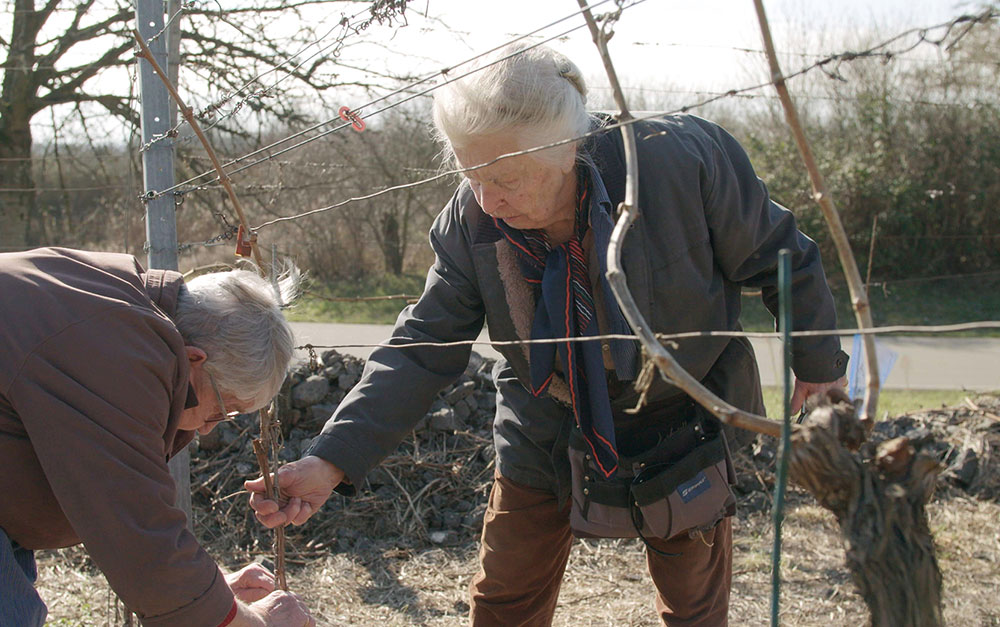 |
hr-television, 6.55 a.m.
Around the small town of Perl in the Saarland, the wines of the region grow predominantly on the shell limestone soils found there. With winemaker Ollinger we get to the bottom of the wine and find ourselves in the ancient layers from the Triassic period.
ORF 2, 2.00 p.m.
Wine has a tradition in Burgenland that goes back thousands of years. Central Burgenland, also called Blaufränkischland, with its popular wine-growing villages such as Lutzmannsburg, Deutschkreutz, Horitschon, and Neckenmarkt, is considered the centre of Austria's red wine culture. In recent years, the winemakers of Blaufränkisch have achieved international recognition. - What is the secret behind the triumph of Blaufränkisch? According to winemaker Albert Gesellmann, great wine is created in the mind and not in the cellar. A look behind the scenes of the production of Blaufränkisch.
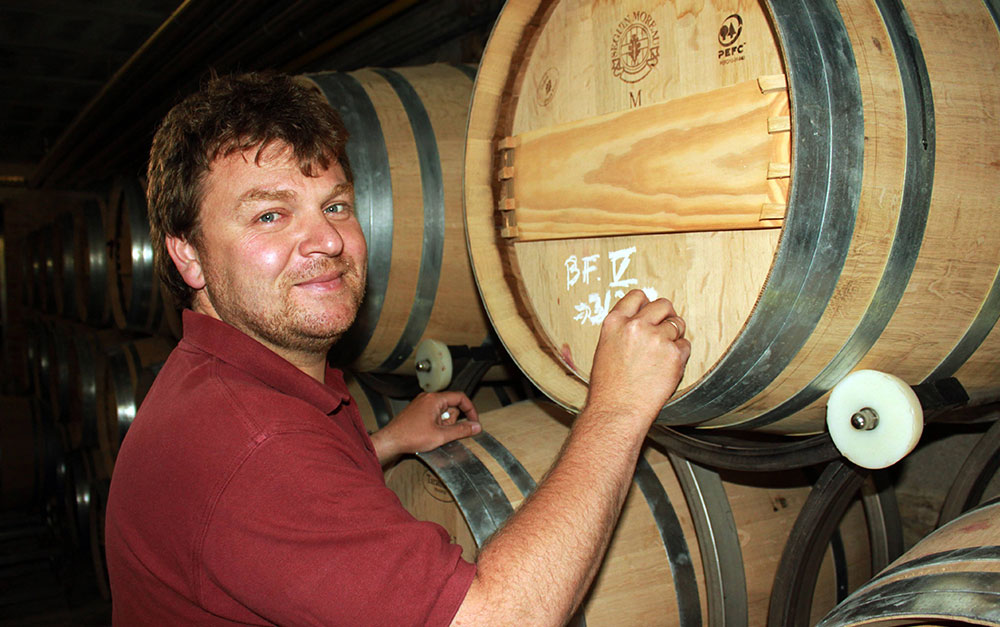 |
arte, 6.35 p.m.
The sensual approach seems typical for the people of the region, who are said to have a special penchant for pleasure. The German Wine Route runs for 85 kilometres from Bockenheim to the French border at Schweigen-Rechtenbach in the Palatinate. Exotic animals, balloonists, young people on longboards and traditional tobacco farmers show that there is much more to discover along this dream route between the Rhine plain and the Palatinate mountains than wine bliss. The region has been characterised by viticulture since Roman times. The remains of an almost 2,000-year-old vineyard near Bad Dürkheim are evidence of this history. Winemaker Markus Schneider is one who, despite all his love of his homeland, also breaks with tradition. He began his training as a winemaker at the age of 15. The programme is also available online from 26/06 to 24/09 on the ARTE internet portal.
arte, 5.10 p.m.
Andreas Korn goes in search of places where people have conquered a piece of Europe with creative ideas and thus opened up a piece of "new territory". So they still exist, the places and living spaces where young people can realise ideas and dreams. For decades, the Pfneisl family of winegrowers could only see the former vineyards of their ancestors in Hungary. Until the Iron Curtain fell, they could only grow wine in Austria. Today the family owns vineyards on both sides of the border. Andreas Korn visits the winegrowing dynasty in the middle of a busy harvest. For decades, the Pfneisl winegrowing family had to cross the Austro-Hungarian border past armed posts to see the former vineyards of their ancestors. For a long time they could only grow wine in Austria. Until the Iron Curtain fell. Today, the family owns vineyards on both sides of the border, and the sisters Katrin and Birgit Pfneisl now produce the noble drop where their great-grandfather once did. Birgit and Katrin, just in their mid-30s, are the young generation of a family that has been growing wine in the border region for over 100 years. Back then, the Austrian Burgenland, where the Pfneisls still have their family home, belonged to Hungary. But due to the new border demarcation after the collapse of Austria-Hungary, the area fell to Austria and the family was no longer allowed to farm on the Hungarian land. Shortly after the fall of the Iron Curtain, Franz Pfneisl, the father of the two sisters, bought back the family's former land in Hungary to continue the old tradition. It was also about making their grandfather happy. To this day, he still goes up the mountain for a few hours when the harvest starts in autumn. Then the whole family lends a hand. And this time Andreas Korn is also there. He visits the winegrowing dynasty in the midst of the busy harvest and dives into the world of wine with the Pfneisl family, which not only tempts him to new delights, but also reveals a lot about the local people and their new home in a united Europe. The programme is also available online from 28/06 to 05/07 on the ARTE internet portal.
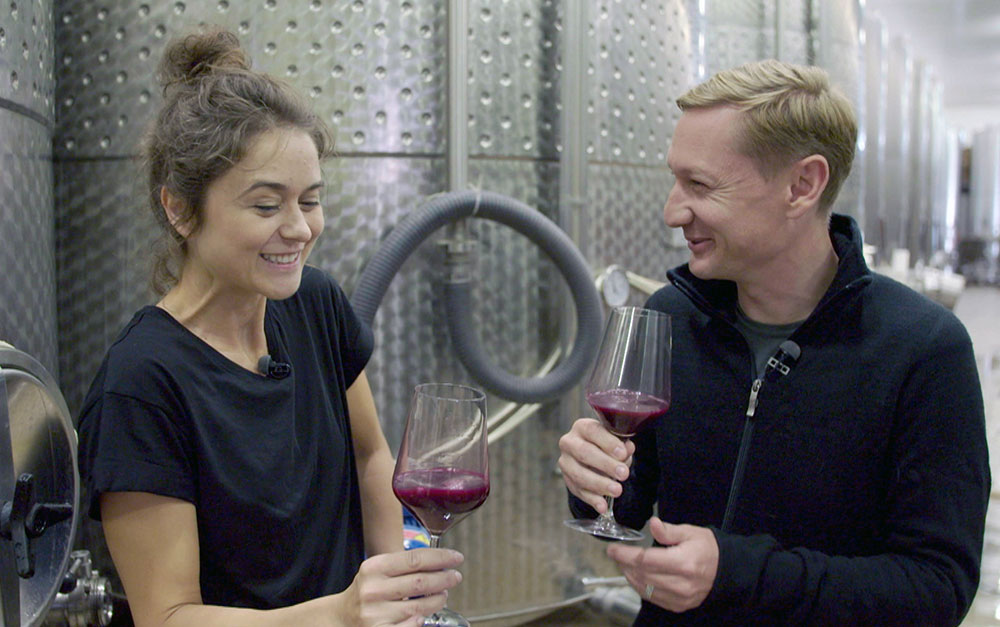 |
SR Television, 8.15 p.m.
On the Luxembourg side of the Moselle, the harmony of fragrant plants and tasty wine is boundless - Dominique Rizzi offers very unusual wine tastings in Bad Mondorf in Luxembourg.
3sat, 21.45
Winegrower Chiara Vigo remembers how, as a child, she had to witness an eruption in the north near Randazzo that destroyed almost all of her family's vineyards: a catastrophe, because to this day one cannot insure oneself against it on Etna. She will never forget that the lava flow left a remnant of their belongings and "miraculously" suddenly changed direction, as Chiara recounts in the film. Together with her husband Gianluca, she now grows the "Nerello Mascalese" here, the typical red grape variety of the few, about 130 winegrowers on Etna. She appreciates that the volcano not only takes but also gives. The fertile and mineral-rich volcanic soil makes it possible to grow wine, olives, pistachios and many other things that make up Sicilian cuisine.
Bavarian Television, 8.15 p.m.
At first glance, it seems like a child's play: lawyer Sarah is supposed to travel to the countryside to hand winemaker Peter the notice to quit his farm. His foster father has died, and the biological son now claims the entire inheritance for himself. But Peter is not scared away that easily. He knows that there was a will in which he was designated as the heir to the estate.